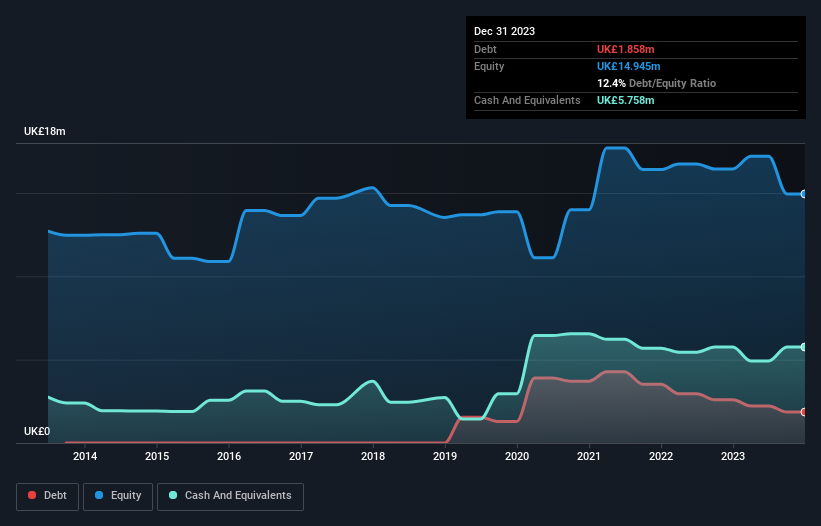- United Kingdom
- /
- Consumer Durables
- /
- AIM:AIEA
These 4 Measures Indicate That AIREA (LON:AIEA) Is Using Debt Reasonably Well
The external fund manager backed by Berkshire Hathaway's Charlie Munger, Li Lu, makes no bones about it when he says 'The biggest investment risk is not the volatility of prices, but whether you will suffer a permanent loss of capital.' So it might be obvious that you need to consider debt, when you think about how risky any given stock is, because too much debt can sink a company. As with many other companies AIREA plc (LON:AIEA) makes use of debt. But is this debt a concern to shareholders?
When Is Debt A Problem?
Debt is a tool to help businesses grow, but if a business is incapable of paying off its lenders, then it exists at their mercy. Part and parcel of capitalism is the process of 'creative destruction' where failed businesses are mercilessly liquidated by their bankers. However, a more common (but still painful) scenario is that it has to raise new equity capital at a low price, thus permanently diluting shareholders. Having said that, the most common situation is where a company manages its debt reasonably well - and to its own advantage. When we examine debt levels, we first consider both cash and debt levels, together.
Check out our latest analysis for AIREA
How Much Debt Does AIREA Carry?
As you can see below, AIREA had UK£1.86m of debt at December 2023, down from UK£2.59m a year prior. However, it does have UK£5.76m in cash offsetting this, leading to net cash of UK£3.90m.

A Look At AIREA's Liabilities
According to the last reported balance sheet, AIREA had liabilities of UK£4.72m due within 12 months, and liabilities of UK£7.82m due beyond 12 months. Offsetting this, it had UK£5.76m in cash and UK£2.61m in receivables that were due within 12 months. So it has liabilities totalling UK£4.17m more than its cash and near-term receivables, combined.
While this might seem like a lot, it is not so bad since AIREA has a market capitalization of UK£11.0m, and so it could probably strengthen its balance sheet by raising capital if it needed to. However, it is still worthwhile taking a close look at its ability to pay off debt. While it does have liabilities worth noting, AIREA also has more cash than debt, so we're pretty confident it can manage its debt safely.
While AIREA doesn't seem to have gained much on the EBIT line, at least earnings remain stable for now. When analysing debt levels, the balance sheet is the obvious place to start. But you can't view debt in total isolation; since AIREA will need earnings to service that debt. So when considering debt, it's definitely worth looking at the earnings trend. Click here for an interactive snapshot.
Finally, a company can only pay off debt with cold hard cash, not accounting profits. AIREA may have net cash on the balance sheet, but it is still interesting to look at how well the business converts its earnings before interest and tax (EBIT) to free cash flow, because that will influence both its need for, and its capacity to manage debt. During the last three years, AIREA produced sturdy free cash flow equating to 57% of its EBIT, about what we'd expect. This free cash flow puts the company in a good position to pay down debt, when appropriate.
Summing Up
While AIREA does have more liabilities than liquid assets, it also has net cash of UK£3.90m. So we don't have any problem with AIREA's use of debt. When analysing debt levels, the balance sheet is the obvious place to start. However, not all investment risk resides within the balance sheet - far from it. For example AIREA has 3 warning signs (and 1 which is a bit concerning) we think you should know about.
When all is said and done, sometimes its easier to focus on companies that don't even need debt. Readers can access a list of growth stocks with zero net debt 100% free, right now.
New: Manage All Your Stock Portfolios in One Place
We've created the ultimate portfolio companion for stock investors, and it's free.
• Connect an unlimited number of Portfolios and see your total in one currency
• Be alerted to new Warning Signs or Risks via email or mobile
• Track the Fair Value of your stocks
Have feedback on this article? Concerned about the content? Get in touch with us directly. Alternatively, email editorial-team (at) simplywallst.com.
This article by Simply Wall St is general in nature. We provide commentary based on historical data and analyst forecasts only using an unbiased methodology and our articles are not intended to be financial advice. It does not constitute a recommendation to buy or sell any stock, and does not take account of your objectives, or your financial situation. We aim to bring you long-term focused analysis driven by fundamental data. Note that our analysis may not factor in the latest price-sensitive company announcements or qualitative material. Simply Wall St has no position in any stocks mentioned.
About AIM:AIEA
AIREA
Designs, manufactures, and sells floor coverings in the United Kingdom and internationally.
Flawless balance sheet and fair value.
Market Insights
Community Narratives



